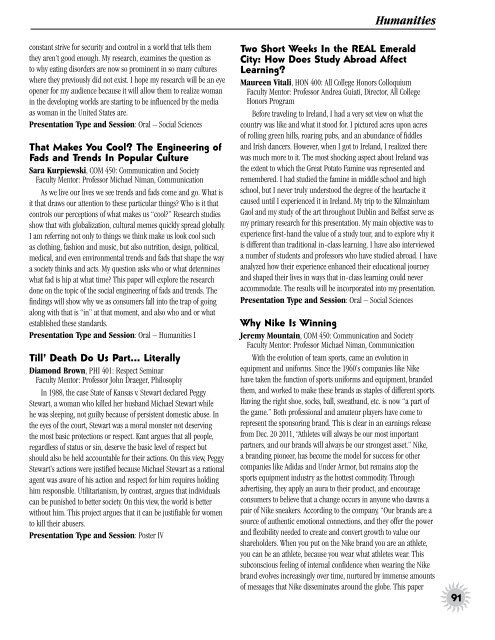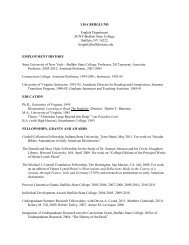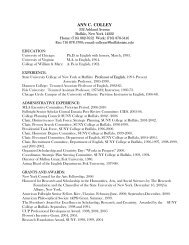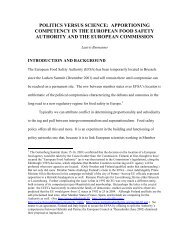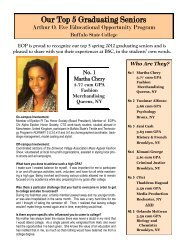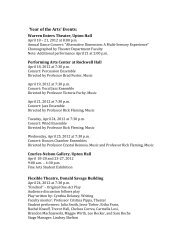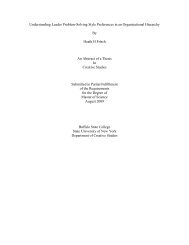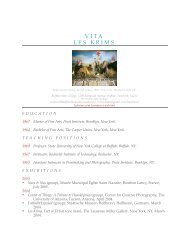Arts - Buffalo State College
Arts - Buffalo State College
Arts - Buffalo State College
Create successful ePaper yourself
Turn your PDF publications into a flip-book with our unique Google optimized e-Paper software.
constant strive for security and control in a world that tells them<br />
they aren’t good enough. My research, examines the question as<br />
to why eating disorders are now so prominent in so many cultures<br />
where they previously did not exist. I hope my research will be an eye<br />
opener for my audience because it will allow them to realize woman<br />
in the developing worlds are starting to be influenced by the media<br />
as woman in the United <strong>State</strong>s are.<br />
Presentation Type and Session: Oral – Social Sciences<br />
That Makes You Cool? The Engineering of<br />
Fads and Trends In Popular Culture<br />
Sara Kurpiewski, COM 450: Communication and Society<br />
Faculty Mentor: Professor Michael Niman, Communication<br />
As we live our lives we see trends and fads come and go. What is<br />
it that draws our attention to these particular things? Who is it that<br />
controls our perceptions of what makes us “cool?” Research studies<br />
show that with globalization, cultural memes quickly spread globally.<br />
I am referring not only to things we think make us look cool such<br />
as clothing, fashion and music, but also nutrition, design, political,<br />
medical, and even environmental trends and fads that shape the way<br />
a society thinks and acts. My question asks who or what determines<br />
what fad is hip at what time? This paper will explore the research<br />
done on the topic of the social engineering of fads and trends. The<br />
findings will show why we as consumers fall into the trap of going<br />
along with that is “in” at that moment, and also who and or what<br />
established these standards.<br />
Presentation Type and Session: Oral – Humanities I<br />
Till’ Death Do Us Part... Literally<br />
Diamond Brown, PHI 401: Respect Seminar<br />
Faculty Mentor: Professor John Draeger, Philosophy<br />
In 1988, the case <strong>State</strong> of Kansas v. Stewart declared Peggy<br />
Stewart, a woman who killed her husband Michael Stewart while<br />
he was sleeping, not guilty because of persistent domestic abuse. In<br />
the eyes of the court, Stewart was a moral monster not deserving<br />
the most basic protections or respect. Kant argues that all people,<br />
regardless of status or sin, deserve the basic level of respect but<br />
should also be held accountable for their actions. On this view, Peggy<br />
Stewart’s actions were justified because Michael Stewart as a rational<br />
agent was aware of his action and respect for him requires holding<br />
him responsible. Utilitarianism, by contrast, argues that individuals<br />
can be punished to better society. On this view, the world is better<br />
without him. This project argues that it can be justifiable for women<br />
to kill their abusers.<br />
Presentation Type and Session: Poster IV<br />
Humanities<br />
Two Short Weeks In the REAL Emerald<br />
City: How Does Study Abroad Affect<br />
Learning?<br />
Maureen Vitali, HON 400: All <strong>College</strong> Honors Colloquium<br />
Faculty Mentor: Professor Andrea Guiati, Director, All <strong>College</strong><br />
Honors Program<br />
Before traveling to Ireland, I had a very set view on what the<br />
country was like and what it stood for. I pictured acres upon acres<br />
of rolling green hills, roaring pubs, and an abundance of fiddles<br />
and Irish dancers. However, when I got to Ireland, I realized there<br />
was much more to it. The most shocking aspect about Ireland was<br />
the extent to which the Great Potato Famine was represented and<br />
remembered. I had studied the famine in middle school and high<br />
school, but I never truly understood the degree of the heartache it<br />
caused until I experienced it in Ireland. My trip to the Kilmainham<br />
Gaol and my study of the art throughout Dublin and Belfast serve as<br />
my primary research for this presentation. My main objective was to<br />
experience first-hand the value of a study tour, and to explore why it<br />
is different than traditional in-class learning. I have also interviewed<br />
a number of students and professors who have studied abroad. I have<br />
analyzed how their experience enhanced their educational journey<br />
and shaped their lives in ways that in-class learning could never<br />
accommodate. The results will be incorporated into my presentation.<br />
Presentation Type and Session: Oral – Social Sciences<br />
Why Nike Is Winning<br />
Jeremy Mountain, COM 450: Communication and Society<br />
Faculty Mentor: Professor Michael Niman, Communication<br />
With the evolution of team sports, came an evolution in<br />
equipment and uniforms. Since the 1960’s companies like Nike<br />
have taken the function of sports uniforms and equipment, branded<br />
them, and worked to make these brands as staples of different sports.<br />
Having the right shoe, socks, ball, sweatband, etc. is now “a part of<br />
the game.” Both professional and amateur players have come to<br />
represent the sponsoring brand. This is clear in an earnings release<br />
from Dec. 20 2011, “Athletes will always be our most important<br />
partners, and our brands will always be our strongest asset.” Nike,<br />
a branding pioneer, has become the model for success for other<br />
companies like Adidas and Under Armor, but remains atop the<br />
sports equipment industry as the hottest commodity. Through<br />
advertising, they apply an aura to their product, and encourage<br />
consumers to believe that a change occurs in anyone who dawns a<br />
pair of Nike sneakers. According to the company, “Our brands are a<br />
source of authentic emotional connections, and they offer the power<br />
and flexibility needed to create and convert growth to value our<br />
shareholders. When you put on the Nike brand you are an athlete,<br />
you can be an athlete, because you wear what athletes wear. This<br />
subconscious feeling of internal confidence when wearing the Nike<br />
brand evolves increasingly over time, nurtured by immense amounts<br />
of messages that Nike disseminates around the globe. This paper<br />
91


